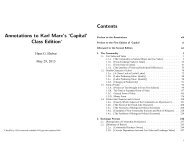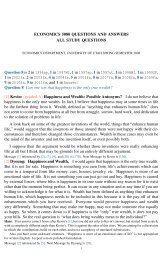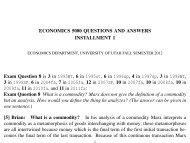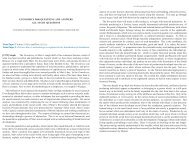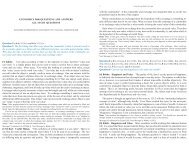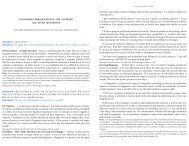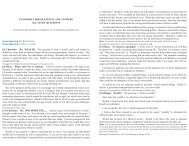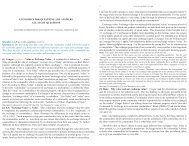Question 1 What did Marx mean with his formu - University of Utah
Question 1 What did Marx mean with his formu - University of Utah
Question 1 What did Marx mean with his formu - University of Utah
You also want an ePaper? Increase the reach of your titles
YUMPU automatically turns print PDFs into web optimized ePapers that Google loves.
U <strong>of</strong> <strong>Utah</strong> Econ 5080 2005fa 75<br />
Hans: You are putting your finger on an interesting feature <strong>of</strong> <strong>Marx</strong>’s theory. Strictly speaking the equalization<br />
<strong>of</strong> all commodities on the market would only be justified if all labor-powers were equal. In reality they are not<br />
entirely equal, they are, say, only 95% equal. T<strong>his</strong> is a good enough fit between surface and underlying production<br />
conditions for markets to function.<br />
Next Message by DarkKnight is [777].<br />
<strong>Question</strong> 117 is 61 in 1995WI, 70 in 1995ut, 74 in 1996sp, 73 in 1996ut, 81 in 1998WI, 88<br />
in 1999SP, 93 in 2000fa, and 93 in 2001fa:<br />
<strong>Question</strong> 117 Does skilled labor (i.e., labor for which schooling and training is necessary,<br />
for instance the labor <strong>of</strong> an engineer) produce more value per hour than unskilled labor (like<br />
the labor <strong>of</strong> a janitor)? Explain!<br />
[1573] Hans: New Homework Assignments. T<strong>his</strong> is one <strong>of</strong> the homework questions assigned<br />
over the Thanksgiving weekend and the Monday after. Answers are accepted starting<br />
right now until Tuesday morning, November 29, at 3 am.<br />
T<strong>his</strong> particular question has been discussed a lot in the archives. See for instance my<br />
[2001fa:41] and [1999SP:47]. These two answers look contradictory but they can be reconciled.<br />
Here I am repeating the list <strong>of</strong> all the homework questions assigned until Tuesday morning<br />
3 am:<br />
(81), (117), (129), (185), 375, 377, 590, 601<br />
Those in parentheses are not in the Annotations, but you can see their text in the emails I<br />
am sending out today.<br />
Next Message by Hans is [1575].<br />
[1600] Rudy: graded A More value per hour. Context is an important factor in answering<br />
t<strong>his</strong> question. The question does not ask if the commodity the labor produces has more<br />
value, neither does it ask which is more valuable to society. The question is whether or not<br />
skilled labor produces more value per hour than unskilled labor. The problem is, how do we<br />
compare labor-powers? It seems the context <strong>Marx</strong> uses as a solution is that the difference<br />
cannot be qualitative, but only quantitative (as to how much value is produced per hour, even<br />
though labor-powers cannot be compared quantitatively).<br />
Considering t<strong>his</strong> context, skilled workers produce more value per hour quantitatively; not<br />
because more labor is going into each hour per individual worker, but because the labor used<br />
to train the worker is added in as well. The annotations use the example <strong>of</strong> the training<br />
needed for a heart surgeon. Hans’s [2001fa:41] is an explanation <strong>of</strong> how a heart surgeon<br />
produces more value per hour than, in t<strong>his</strong> case, a group <strong>of</strong> fast-food workers. He states,<br />
“The labor <strong>of</strong> a surgeon creates more value per hour only because he had to spend so much<br />
time studying medicine and being trained as a doctor.” The annotations explain that the<br />
value per hour ratio would become greater as one adds in the labor by teachers and the labor<br />
needed to produce training materials and equipment.<br />
In these terms <strong>Marx</strong> explains that “...a smaller amount <strong>of</strong> complicated labor is equal to<br />
a bigger amount <strong>of</strong> simple labor.” Therefore as the skilled labor is reduced to multiples <strong>of</strong><br />
76 2005fa Econ 5080 U <strong>of</strong> <strong>Utah</strong><br />
unskilled simple labor, the result is a quantitative greater amount <strong>of</strong> value per hour, though<br />
qualitatively, labor-power is still generally equal.<br />
Hans: The market equates all commodities to money, i.e., makes them quantitatively comparable and therefore<br />
qualitatively equal. <strong>Marx</strong> is looking for an underlying element in production which is also quantitatively comparable<br />
and qualitatively equal. Labor-power almost fits the bill: most labors in society can be performed by almost<br />
any worker (<strong>with</strong> the proper training). And even those labor-powers which are qualitatively different (the labor <strong>of</strong><br />
an great artist and scientist) will somehow be reduced to some quantitative multiple <strong>of</strong> simple labor.<br />
Next Message by Rudy is [1799].<br />
[1603] PAE: I definitely think that more skilled labor positions produce more value per<br />
hour than positions, which are less skilled and I think the education that goes into obtaining<br />
these positions has a lot to do <strong>with</strong> it. Even though I believe all labor no matter how skilled<br />
or unskilled is vital to any business and society who hopes to succeed there is a difference<br />
in value being produced.<br />
When we look at engineers, doctors, teachers, and many others, the time that is put in, in<br />
order for them to obtain those jobs, helps them produce more value hourly. Almost anyone<br />
given enough time could figure out how to do a doctor’s job but the fact that a doctor has<br />
gone to school makes him/her so much more efficient at doing that job. Therefore they are<br />
able to be more efficient and get more done per hour than a normal person would be able<br />
to do. Also I believe <strong>with</strong>out the high skilled labor positions the lower/unskilled positions<br />
would not be available. A hospital could survive <strong>with</strong>out a janitor or maintenance worker<br />
but could not survive <strong>with</strong>out doctors. To me t<strong>his</strong> signifies the higher value per hour, which<br />
skilled positions create.<br />
Now if you look at unskilled positions the same could probably not be said. I think many<br />
<strong>of</strong> us could take over the position <strong>of</strong> a janitor and be able to come close if not match the work<br />
per hour they were doing. In addition while it is evident we need those positions a company<br />
can live <strong>with</strong>out them in the short run and in some cases maybe the long run.<br />
Hans: You are looking too much at the whole and its interconnections. The value created by a laborer is something<br />
very individualistic. Individuals are very versatile. They can produce many different things, and they can also<br />
produce in different ways: either something which does not need special training, or something for which many<br />
years <strong>of</strong> schooling is needed. How they allocate their time can be adjusted, but one thing is fixed, namely, the<br />
number <strong>of</strong> workers available in the society. T<strong>his</strong> is why the total labor time, including schooling, matters for the<br />
value <strong>of</strong> the output.<br />
Message [1603] referenced by [1622]. Next Message by PAE is [1664].<br />
[1605] Zone: graded A When looking at the difference between skilled and unskilled<br />
laborers in the marketplace, they produce the same amount <strong>of</strong> value per hour but are not<br />
compensated the same financially. When looking at the skilled laborer, the worker has invested<br />
time and training to perform the job. The unskilled worker is able to do <strong>his</strong> job <strong>with</strong><br />
no training. Therefore, the skilled laborer has more abstract-labor in each hour <strong>of</strong> work performed.<br />
The time the skilled worker invests in training is not considered the value here. If<br />
you look at the amount <strong>of</strong> value produced over the lifetime <strong>of</strong> each worker they should equal<br />
out because the skilled laborer was investing the time it took to learn the skill, while the<br />
unskilled laborer was creating value. Per hour <strong>of</strong> work, each individual ends up creating the<br />
same amount <strong>of</strong> labor even though they have different skill levels over the lifetime <strong>of</strong> working.<br />
The reason one might think that the skilled laborer creates more value is the difference<br />
<strong>of</strong> wages they are paid. The reasons for t<strong>his</strong> arise because <strong>of</strong> the way the Capitalist society



